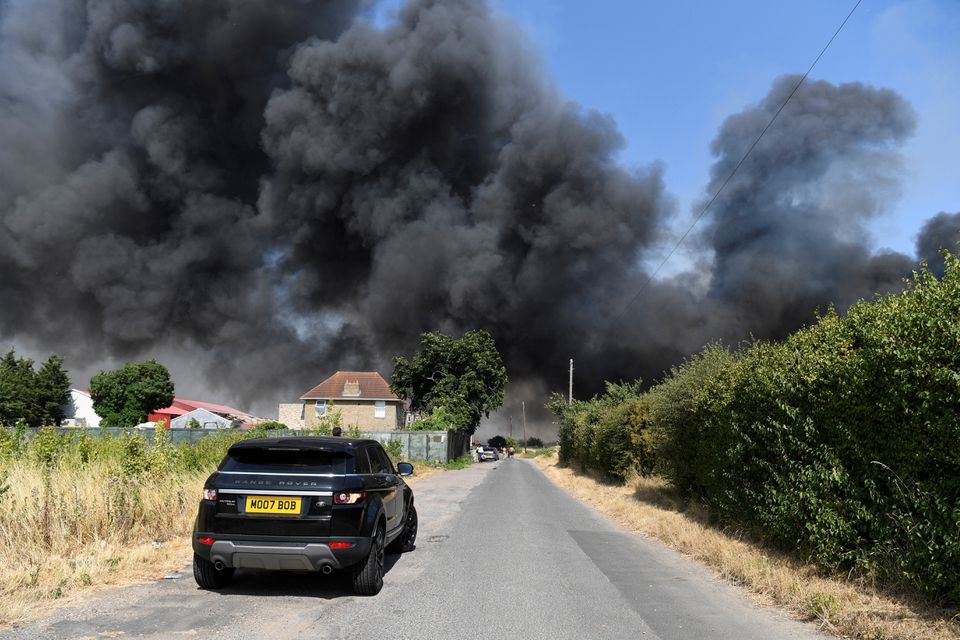Heat-Related Deaths Up By 68% In Recent Past: Lancet Report

A car drives near a fire that burns during a heatwave, in Rainham, east London, Britain on July 19, 2022 (Reuters)
(Source: PTI)
Heat-related deaths increased by 68 per cent between 2000-2004 and 2017-2021, while vulnerable populations — the elderly and children less than a year old — were exposed to 3.7 billion more heatwave days in 2021 than annually in 1986-2005, according to a global report.
The report, brought out by Lancet Countdown, focuses on the health effects of climate change amid the health, social and economic aspects of the COVID-19 pandemic, global energy and cost-of-living crises brought about by the Russia-Ukraine conflict and a persistent overdependence on fossil fuels.
While floods in Australia, Brazil, China, Malaysia, Pakistan and other countries have caused thousands of deaths, displaced hundreds of thousands of people and caused billions of dollars in economic losses, wildfires have caused devastation in countries like Greece, Algeria, Italy, Spain and record temperatures have been recorded in many countries, according to the report.
According to the report, extreme weather events caused damage worth USD 253 billion in 2021, particularly burdening people in low human development index (HDI) countries in which almost none of the losses were insured.
Food security was affected by climate change because higher temperatures threatened crop yields directly with the growth seasons of maize on average nine days shorter in 2020 and the growth seasons of winter wheat and spring wheat six days shorter than for 1981-2010 globally, it said.
Health systems are the first line of defence in an atmosphere where health impacts due to climate change worsen and compound other co-existing crises. However, just as the need for health care rises, health systems are being debilitated by the effects of the pandemic and cost-of-living crises.
Urgent action is, therefore, needed to strengthen health system resilience to prevent a rapidly escalating loss of lives and to prevent suffering in a changing climate.
In 2022, while marking the 30th anniversary of the signing of the UN Framework Convention on Climate Change (UNFCCC), countries agreed to prevent dangerous anthropogenic climate change and its deleterious effects on human health and welfare.
However, according to the Lancet report, this has been followed up with little meaningful action.
Fossil fuel dependence not only undermines global health through increased climate change impacts, but also affects human health and wellbeing directly, through volatile and unpredictable fossil fuel markets, frail supply chains and geopolitical conflicts, it said.
In low HDI countries, only 1.4 per cent of their electricity came from modern renewables, that is, wind and solar power in 2020. An estimated 59 per cent of healthcare facilities in low and middle income countries still do not have access to reliable electricity needed to provide basic care.
On the other hand, oil and gas companies, the report said, are registering record profits, even as their production strategies continue to undermine people’s lives and wellbeing.
The world’s largest oil and gas companies, as of February 2022, have been understood to exceed their share of emissions consistent with 1.5 degrees Celsius of global heating by 37 per cent in 2030 and 103 per cent in 2040, continuing to undermine decarbonisation efforts, it said.
Making things even worse, governments continue to incentivise fossil fuel production and consumption, the report said.
Simultaneously, countries failed to meet their commitment mobilising the considerably lower sum of USD 100 billion annually by 2020 as agreed at the 2009 Copenhagen Accord to support climate action in “developing countries” and climate efforts are being undercut by a profound scarcity of funding, it said.
The Lancet Countdown indicators, after 30 years of UNFCCC negotiations, show that countries and companies continue to make choices that threaten the health and survival of people in every part of the world.
At this critical juncture, the report said, an immediate, health-centred response can still secure a future in which the world population can not only survive, but also thrive.
Taking stock of the health impacts of climate action, Lancet Countdown brought out this report to help countries realise the ambition of making the Paris Agreement the “most important public health agreement of the century”.





